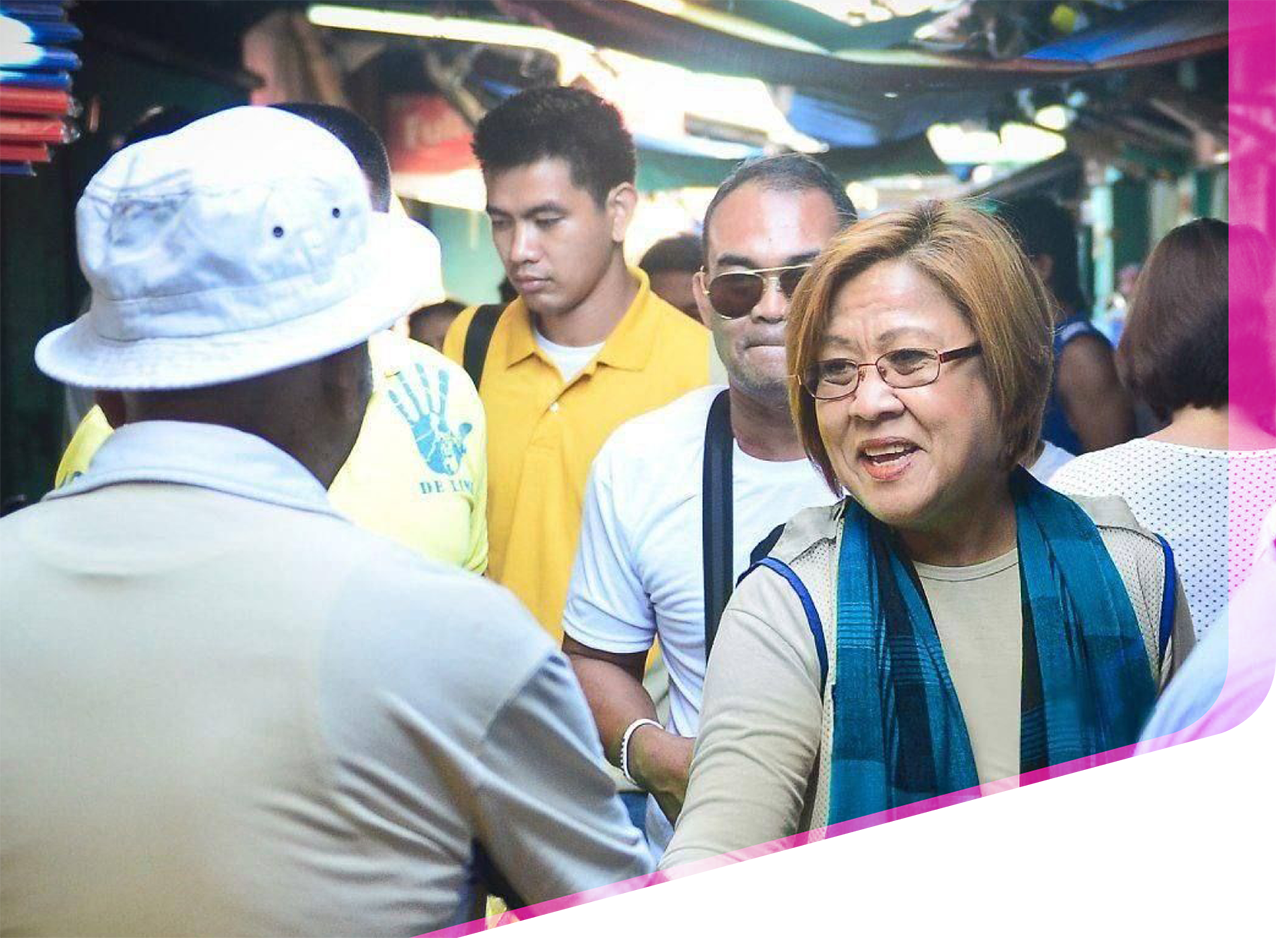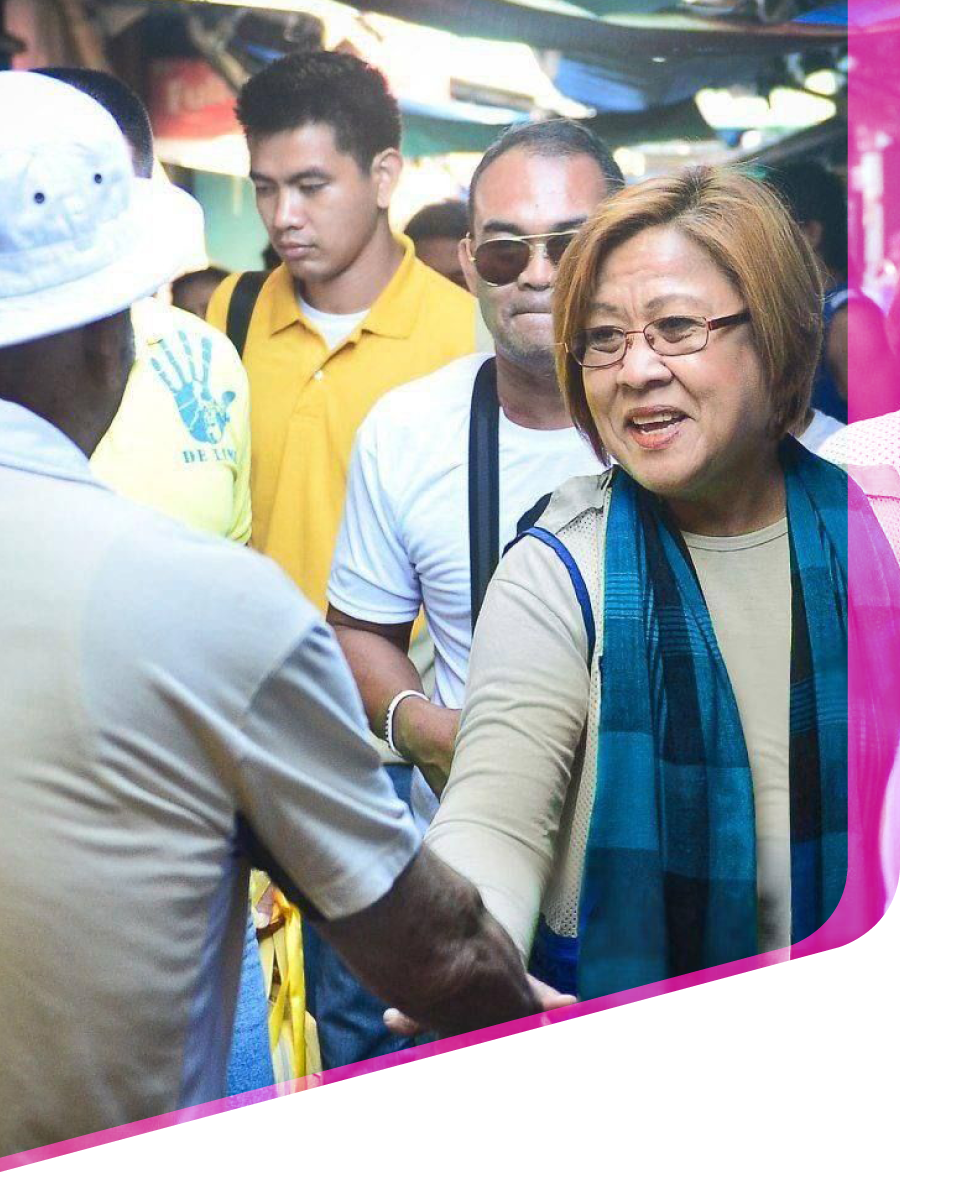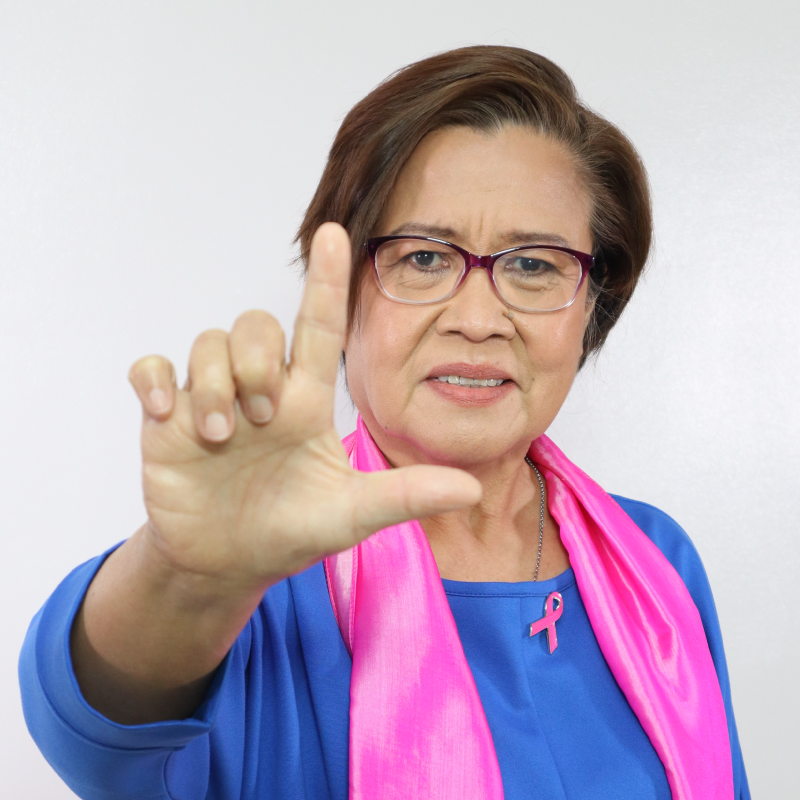
Philippines
Philippines
Philippines
Leila M. de Lima
Leila M. de Lima
Leila M. de Lima
Lawyer and Pro-Democracy activist
Lawyer and Pro-Democracy activist
Lawyer and Pro-Democracy activist

Philippines
Leila M. de Lima
Lawyer and Pro-Democracy activist
“Always fight for what you think is right no matter what the cost.”

VITA
Leila M. de Lima is a Filipina lawyer and human rights activist. She served as Chair of the Commission of Human Rights (CHR) from 2008 to 2010, as Secretary of Justice from 2010 to 2015, and as Senator from 2016 to 2022. As a Senator, Leila M. de Lima started investigations on the extra-judicial killings committed in the so-called “War on Drugs”, which the former president of the Philippines, Rodrigo Duterte, launched after assuming office in 2016. In her role as the CHR Chair, she opened an inquiry into Duterte’s involvement in extrajudicial executions during his time as Mayor of Davao City. On politically motivated charges, she was arrested in February 2017 and has been held in detention for more than six years. In May 2022, two key witnesses retracted their testimony in the government’s case against Leila M. de Lima. She was released on bail on 13 November 2023, and finally acquitted on 24 June 2024. She is now the spokesperson of the Liberal Party.
The last time we talked for FNF's publication “Human Rights Defenders” in 2022, you said you were optimistic about freedom towards the end of Duterte`s term about your detainment. Now after almost 7 years you are no longer imprisoned. Do you consider it a victory? Can you tell us why or why not?
It is a victory, morally and at the same time legally, but on the side of legal victory, it is just partial because I still have a third remaining case where I am just out on bail, although I am optimistic about it. It’s a victory because, well, during Duterte’s time, I knew that I had no chance of being released when he was still there until 2022. And then, when Marcos came, they were allies, so I said it would still be quite an uphill battle for me. But then when the cracks were already happening between the two camps, I felt optimistic. No pressure, no negative pressure in so far as judging the case on the merits. It is a victory because of what I went through. Their whole agenda is to silence me and to break my spirit. They did not succeed because I came out stronger and stronger, but I was very conscious of that. Why they did that to me? They just needed to destroy me, so my whole attitude was why I should give them the satisfaction or the pleasure of feeling that they succeeded. So even if it was really difficult morally, I mean, mentally, physically, and emotionally, I have to endure. Because I survived it with God’s help, and I felt I won, it’s a victory. It’s a moral victory. The fact that I regained freedom on 13 November 2023 when I got that bail, I felt I was victorious but I know that it is still a long struggle and a long fight not only for justice for myself because certainly I would want justice for what they did to me and also justice for the sector that I’ve been fighting for and these are the victims of the drug war killings. So yes and no, it’s already a victory, morally and also partially, legally. But then, I can only claim complete victory if I can also achieve and see justice being granted to these victims whose causes I have been fighting for.
What prepared you for that?
It is probably in my DNA. I have been raised, especially by my father, to be strong. I belong to a family or a clan with really strong women. My aunts, some cousins of mine and my grandmother on the father's side are strong-willed women. There are so many stories about my grandmother being courageous and strong-willed. Therefore, I was raised by my father like that. I would remember that he would say, “Always fight for what you think is right no matter what the cost.”
And that he got from his mother?
He got it from his mother. And he’s my role model, my father’s my role model and that is why I became a lawyer. I can see him early on how he served as a lawyer to many people there in our area in Bicol.

Your release has re-ignited the hearts of many Filipinos about the protection of rights of pro-democracy activists and those who are detained because of vested political interests. How do you feel about how the current political environment would treat those who are still detained and those who show to send against the populous truth.
Just about less than a month ago, I visited the Correctional Institute for Women (CIW). I had a dialogue with several female political detainees and they are all complaining about being victims of fabricated cases. So we have not heard anything, any direction, or any policy in the current administration on how to deal with those cases. Now also, we have seen abduction cases like the case of Jonila Castro and Jhed Tamano. Why are these abductions still happening? So far, the drug war killings are concerned, yes they have flaunted the change in policy from punitive to rehabilitative health-based, and at least based on their pronouncements they seem to not have encouraged killings. So we can say that at least on the surface, it is not something that is state-inspired or state-sponsored but more has to be done, because there are still no categorical explicit pronouncements from the President saying you stop the killings, whoever they are.
Do you think after six years of Duterte’s regime, there has been changes in treatment of vocal human rights activists in the country? How do you see red-tagging in the Marcos Administration?
There is still red-tagging and that is why Ms. Irene Khan had to openly call for the stoppage and I have also been calling for that, because there is still red-tagging. It is just another instrument of repression because again, this is a remnant of Duterte’s practices. This time around, the administration is more open, and more tolerant about political dissents.
If you were to impart any insight to those still detained and those who are in fear of detention for speaking truth to freedom. What can you tell them as they continue to fight for human rights and democracy?
They just have to carry on, they just have to endure, and they just have to persevere in the causes they are fighting for. The causes worth championing are worthy noble causes so it’s a daunting role to play to be championing other people’s rights, those who are the powerless, the voiceless, and the oppressed but it’s the most noble thing to do. So you shouldn’t think of quitting from your advocacies. You just have to endure, persevere, and embrace more faith in yourself. If you’re a believer, faith in the good Lord. And faith in other people, your co-defenders, your co-advocates because collective action is paramount.
Philippines
